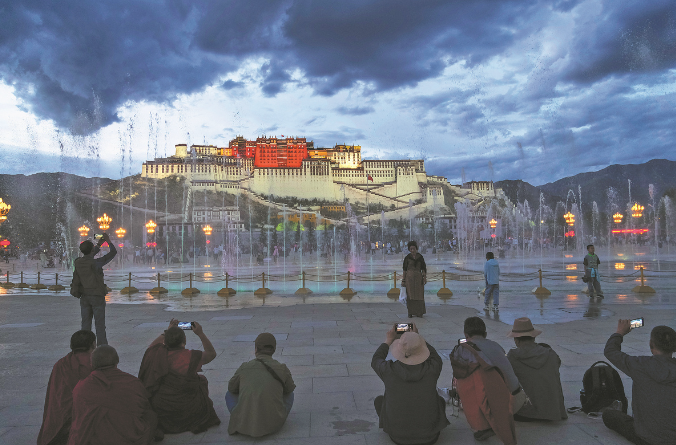Nighttime economy helps lift Lhasa
Updated: 2023-10-30 By DAQIONG and PALDEN NYIMA in Lhasa (China Daily)  Print
Print 



People enjoy the night view of Potala Palace in Lhasa, Tibet autonomous region, on June 27. [Photo/China News Service]
After sunset, Tibet's capital continues to promote region's cultures, traditions to visitors
The nighttime economy continues to be a driving force of the socioeconomic development in Lhasa, capital of the Tibet autonomous region.
Zangyoutancheng, a tourism and culture complex in the city, is a big hub for nighttime activities.
You Yu, general manager of the complex, said that what makes it unique in Lhasa is that it not only offers a variety of dining options and cultural and tourism products that visitors can enjoy, it also helps them learn about Tibetan culture by visiting different sites in the complex.
You said the structure's design is quite special. It was built in the shape of a mandala and blends the characteristics of Tibetan, Nepali and ancient Chinese styles, reflecting the integration of different civilizations.
"Every night, we have one-hour artistic performances. These performances tell the stories of the different cultures and customs of the people in the region's seven cities and prefectures," said You, adding that the complex also features small theaters and museums — including a wax museum of famous Tibetans — as well as exhibition halls displaying butter sculptures, Tibetan medicines, thangka paintings and ancient objects.
"These old objects are not replicas, and we spent a lot of money to buy them," she said.
You said another attraction of the complex is the beer square, which consists of bars filled with Tibetan decorations. Another bar that brews German craft beer has become a hot spot for visitors at night.
You said the craft bar uses special equipment to make German and Danish style beers. It also produces local barley beer as well.
The complex has attracted the influx of more than 100 companies that provide more than 1,000 jobs for locals, You said, adding it received an average of 5,000 tourist visits per day between June and October this year.
Lhasa made the list of China's top 100 cities boasting the most prosperous nighttime economies, according to the 2023 China Nighttime Economic Development Report released in July. The nighttime economy refers to business activities that take place between 6 pm and 6 am in service industries such as leisure, tourism, shopping, fitness, culture and catering.
The list was published by the Juliang Yinqing City Research Institute, a branch of the Beijing-based marketing service platform Ocean Engine.
According to Lhasa's commerce bureau, the city recognized several shopping centers as demonstration zones of its nighttime economy last year.
Wu Haiyu, an official at the bureau, said the Tibetan capital aims to further drive consumption via its nighttime economy.
"The development of Lhasa's nighttime economy will lead to more possibilities and further contribute to growth," Wu said.
"In recent years, with the accelerated pace of urban construction, the increasingly improved urban infrastructure and the overall improvement of the city's image, Lhasa's nighttime economy continues to flourish," she added.
Chen Hao, deputy general manager for the Gongdelintianjie Shopping Center, said tourists and young customers are the main targets of the center, and the traditional discount promotion model has been upgraded to a scene marketing one, in which a product's characteristics are highlighted.
"Since August, 72 new catering businesses have settled in our center. Collectively, they have seen 30 percent growth and have achieved a total sales volume of more than 113 million yuan ($15.5 million). At night, the cultural and food market of our center offers performances and leisure activities in cultural venues," Chen said.
"The nighttime economy is essentially the extension of the time and space provided for cultural and tourism consumption, which are key to the overall economy."








